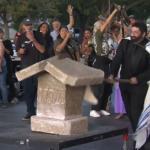Can I Step Up?
Palm Sunday
 I don’t know what you’re seeing everywhere you turn, but all I see is politics, politics, politics…in today’s scripture lesson from Luke’s gospel.
I don’t know what you’re seeing everywhere you turn, but all I see is politics, politics, politics…in today’s scripture lesson from Luke’s gospel.
As you know, politics—good politics, that is—is all about narrative, about telling an alternate story as counterpoint to the troubled story going on around us…and getting people to buy into it; to believe it. Our first clue that this is what’s going on in today’s gospel lesson is that yet again this week we read a version of a story found in all four gospels—Matthew chapter 21; Mark chapter 11; John chapter 12; and today: Luke chapter 19. As you know, the same story appearing in every gospel is very unusual; it’s a sign to pay attention.
Every gospel writer adds his own personal embellishments to the story—it’s a human thing, as any good courtroom lawyer will tell you. For example, Luke’s version of the Palm Sunday story that we heard today doesn’t mention palms one time, but we wave them anyway. We don’t mind adding to Luke’s story by waving palms in worship, primarily, I think, because our kids are so darn cute!
It doesn’t really matter which gospel account of today’s story you read: all of the gospel writers are telling a story, some of the longest stretches of story-telling in each book. To keep the narrative moving, all of them need to get Jesus to Jerusalem to continue the events of the week ahead. And any one of them, Luke included, could have accomplished that with a simple verse, like: “Then Jesus said to his disciples, ‘Hey! Let’s go to Jerusalem!’ And they went.”
Instead, each version of the story is full of symbols that are meant to show us that something bigger and more important than just a first century road trip is going on here.
Something political.
Today, Palm Sunday, is the final Sunday of Lent, this season of introspection and confession, and today begins the holiest week of the Christian year. From this vantage point we can look out over the next few days and we know what to expect, the tension in the story mounting, the suspense keeping us on the edge of our seats. You’ll recall we’ve been working to get to this point by practicing a Lenten discipline of asking a series of questions; hard questions, like: Can I resist temptation? Can I give up my life? Can I admit I’m wrong? Can I forgive? Can I be open? Today as we stand on the edge of holy week, we turn from more introspective queries toward one that faces outward, into the hurting and broken world around us. Can I step up?
Can I raise my voice and use my life to advocate for what is good and just and right, even when some days I feel like one, solitary, lonely voice raised against a cacophony of evil? To answer this question we’ll have to gather together all the work we’ve done these past five weeks and think hard about what our formation as followers of Jesus Christ means for our witness in the world.
We heard a story today of a parade on the outskirts of Jerusalem. More than thirty years have passed since the angels sang on that Galilean hillside announcing the birth of a special baby, but as we imagine today’s little donkey-led processional making its way up the dusty hill toward Jerusalem, we hear Luke telling us about Jesus’ disciples, gathered around and yelling at the top of their lungs, “Blessed is the king who comes in the name of the Lord! Peace! And glory in the highest heaven!” Jesus, the prince of peace, born into humble circumstances yet poised to share the most profound message. Jesus, the celebrated rabbi, coming toward the seat of power, propelled by the enthusiasm of the crowd and cheered by a call…for justice and peace. For everybody.
We modern readers wouldn’t automatically know this, but Jesus and his followers were not just taking a benign road trip to Jerusalem. They were actually staging a political protest.
And it was a protest rife with imagery intended to raise the temperature of the already heated political situation to its boiling point. Mark’s version of the story even tells us that Jesus and his disciples planned the whole thing ahead of time…for the purpose of making a statement; of standing in opposition; of protesting the misuse of power and the oppression of the vulnerable.
It was staged as if to say, “Pay attention! A king is coming, alright, and he’s about to go head to head with the powers that be!” And with that, the central conflict for the week ahead is played out on a grand scale—Jesus, intentionally disrupting the Pax Romana—the “Roman peace,” to say: “The way things are is not okay. We do not find our collective salvation in a political system. We find it in the radical gospel of love.”
There will be choices to make, sides to take here. The question for those first century Jesus followers was: can you step up?
Recall that this story happens during Passover, one of the most important celebrations of the Jewish year, during which the city of Jerusalem was swollen with Jewish pilgrims from all over. And Passover was one of the most inherently political celebrations in all of Jewish life. Remember, Passover celebrates the liberation of the Jews from slavery in Egypt, God’s political and revolutionary act of freedom.
But Passover in the Jewish holy city, occupied at the time by oppressive Roman rulers, was a tinderbox waiting to catch fire at any spark, because life under Roman rule was brutal. One ancient historian wrote, “[The Romans] rob, they slaughter, they plunder—and they call it ‘empire.’ Where they make a waste-land, they call it ‘peace.’”[1] And, believe me, the Roman leader of Jerusalem, Pontus Pilate, was very aware of the potential danger of dissent, of the fact that when people who are riled up get together and someone gives them a common purpose, they soon become political.
Pilate usually spent most of his time in a beautiful palace on the Mediterranean coast. But every year when Passover approached, the governor always came back to Jerusalem. It was just basic necessity, Pilate’s annual show of power. Because of all the political undercurrents of Passover, it was always Pilate’s aim to make sure the Jews didn’t get ideas of liberation in their heads, and maybe even to get them to buy into the Roman illusion of peace—to vote against their own interests, in other words.
And so, every year Pilate would parade into Jerusalem with a show of military power— cavalry on horses, columns of soldiers, leather armor, helmets, weapons, banners, drums. As Jesus and his little band of protestors made their way from Galilee into Jerusalem from the north, right across town on the west entrance of the city, Pilate was doing his best to make a show of force, to rile up a crowd and give them a political purpose.[2]
Going beyond words, acting out of the radical inward transformation of the gospel message, Jesus asked his disciples to step up—to stand up with their cheers and their actions and their very lives—to step up and speak out against the brutality and violence and oppression and injustice—right on the other side of town!—that stood in stark contrast to the radical message of the kingdom of God.
Our question today is the same. Can I step up?
Jesus asked his disciples to put all they’d been learning into radical action and go into the next village to find a donkey. He asked the owners of that donkey to donate it for the cause. His action invited the people in the crowd to lay down their coats, as they would in the presence of a king—to protest. And his courage inspired the disciples and then the crowd to start cheering, “Blessed is the king who comes in the name of the Lord!” There’s a counter narrative here, and it will not be silenced.
But guess what? There were Pharisees in the little band of folks entering the city with Jesus. They saw everyone around them stepping up to voice this radical message of the coming of the kingdom of God, and they did not like it. Not one bit. They told Jesus to tell the crowd to stop: too dangerous; this will make the Romans mad; and if we get behind them, they may reward us with position, power, influence!
No, Jesus said. No. It’s now or never; it’s time to step up.
Today, Palm Sunday, Luke presents you and me with a powerful story. But this is not a historical account of events in Jerusalem during Passover in 30 AD. Luke is offering us a political narrative. It was an invitation to the first Christians, and it’s an invitation to you and me: if we are going to step up in the radical way of Jesus today, I’m afraid we’re going to have to get political.
There’s a parade going on in our country. Loud voices yelling messages we wouldn’t allow our five year olds to speak on the playground. These voices know that when someone gives a group of people a common purpose, they soon become political, whipped into a frenzy around vague messages of dominance and one-upmanship. These voices intend to divide us, to marginalize people who cannot afford to be further marginalized, to breed distrust. These voices are calling for the silencing of dissent and the use of violence to promote an agenda of hatred.
This is shameful, and it is wrong. There is no peace or justice to be had in service to this kind of despicable rhetoric. We have a question before us today: can I step up? Will we join what seems to be an increasingly unpopular group calling for justice and peace, equity and opportunity, values that sound a whole lot like the coming kingdom of God that Jesus was always talking about?
Can you step up? Step up for the millions in our country who still struggle to find affordable healthcare? Step up for the quickly disappearing middle class, working several jobs while they slide with no safety net into poverty? And those in abject poverty who cannot in their wildest dreams imagine earning even a living wage? Can you step up for our earth—getting warmer and warmer every day, in ways that make the lives of the most vulnerable even more perilous?
Can you step up for black and brown people killed by police officers in the streets? Can you step up for women, 2/3 of the world’s enslaved—some even in this country, or at least doing the same work as men for less pay, all the while demeaned and sexualized at every turn? Can you step up to say we will welcome the stranger instead of building a wall? Can you step up for Muslim Americans in fear of being registered? Can you step up for innocents killed by yet another person who stopped at the store to pick up a gun on his way over to express his discontent by slaughtering folks in cold blood, just because he can?
Jesus entered Jerusalem overhearing echoes of the crowd across town perhaps yelling something like, “Make Jerusalem Great Again!”
And we hear them, too. Benedictine Joan Chittister reminds us: “[T]his is the same Jerusalem over which Jesus wept. This is the great society that has forgotten the widow and the orphan, that enthrones the Pharisee and stones the prophets, that speaks of morality while it institutionalizes the immoral. We decry violence and practice it. We talk about equality and deny it. We practice religion and forget the gospel.”[3]
Can you step up? Can I step up?
It’s holy week this week, and I’m sure that we’ll be lining the roadways for one parade or another. But we’re going to hear voices telling us to quiet down on the calls for peace and justice, on cheers announcing the coming kingdom of God. Too radical; too countercultural; too rigorous; too dangerous. It might even lead to a cross.
It did lead to a cross.
Can I step up?
Over these past weeks I’ve invited you to reflect in silence when I ask you finally the question of the week, but not today. Silence just doesn’t seem to align with what Jesus has asked us to do here…because we’re looking out over a long darkness, and it’s terrifying to think of stepping up alone. But when we raise our voices together, we might find we can summon the courage to step up.
Today we must answer this question for ourselves, loud enough for the world to hear our alternative parade…because the way of love is the only way to life, as Jesus assured the self-interested Pharisees that day in Jerusalem. The gospel message of radical love will not be silenced. If you don’t step up, if I don’t step up…the very stones on the streets will cry out.
Can you step up?
[1] Tacitus, quoted in commentary from Working Preacher, by Michael Joseph Brown.
[2] The Last Week, by Marcus Borg and John Dominic Crossan
[3] http://natcath.org/NCR_Online/archives2/2001a/033001/033001m.htm
















